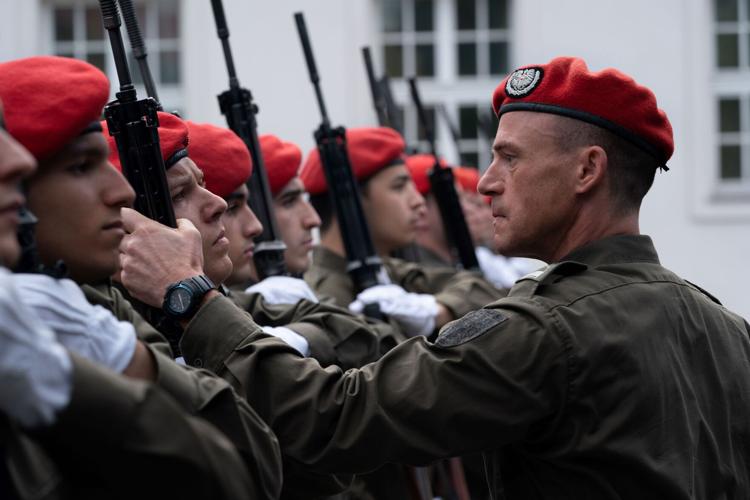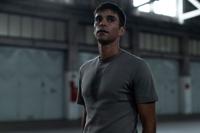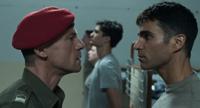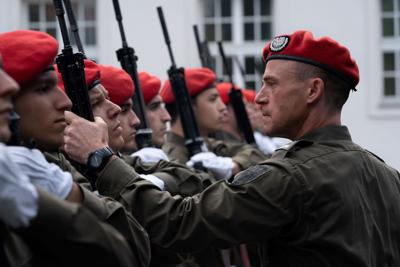This film comes from Austrian filmmaker David Wagner in his feature debut. It's based on the true story of a LGBTQ officer in the Austrian Army who falls in love with a fellow soldier. My only experience with cinema from Austria is that of Michael Haneke who doesn't often do romantic films. His Oscar-winning Amour (2012) was romantic but still ultimately tragic. It was about an elderly couple, living in France. His provocative film The Piano Teacher (2002) is arguably romantic but again more twisted and tragic than swoon-worthy or heart-swelling. Unlike its neighbor, Germany, with the likes of Rainer Werner Fassbinder and Tom Tykwer, there hasn't been a lot of LGBTQ cinema coming from Austria.
The one exception is Great Freedom (2022), which was Austria's official submission to the 94th Academy Awards for Best International Feature. Great Freedom was about Paragraph 175 and how it made male homosexuality illegal, as well as 175's effect on gay men. However, even though that film was Austria's official submission, the film itself was set in Germany. Of the few LGBTQ films, actually set in Austria, Klaus Händl's Tomcat (2016) and Gregor Schmidinger's Nevrland (2020) don't really tackle the issue of homophobia, especially not in overly masculine institutions like the military. This is perhaps an important topic because unlike in the United States, Austria still has conscription, which is compulsory military service for all males at age 18 for six months and eight years in reserve. This film, based on a real person, does tackle that issue.

Gerhard Liebmann stars as Charles Eismayer, an officer in the Fourth Guard Company. He's a Sergeant Major in that army. His current assignment is drillmaster, responsible for training recruits who are new to the military. He's very much like a bulldog and can be that typical drillmaster who barks or yells at recruits who don't do exactly what he says as quickly as he wants it or who talk back. He has a wife and child. He loves his son who seems about 5 or 6. Yet, he increasingly is spending less and less time with his wife. Instead of coming home, after work, he slips off into the night to meet up with someone for a rendezvous in the backseat of a car.
Luka Dimic co-stars as Mario Falak, a recruit who comes to the Fourth Guard Company. He refers to himself as "Yugo," which probably means he was likely born in Yugoslavia. It's not exactly clear when this film takes place but it's likely the early 2000's or 2010's. As such, there is no longer a Yugoslavia. At some points, in addition to German, Mario seemingly speaks Bosnian. He's therefore an immigrant or has a different background than the rest. It's yet another thing that has Mario standout amongst the various Austrian recruits. The first thing that has him standout is the fact that he's revealed to be gay.

What's interesting about Wagner's screenplay is that the homophobia that's being addressed doesn't manifest in the way one expects. Yes, there is that typical locker room or group shower, gay panic aspect between certain young men in close quarters. However, it seems that the dilemma when Charles learns of Mario's sexuality is doing what he can not to come across as homophobic. An incident where Charles has to punish Mario results in Charles getting almost reprimanded because it seems as though the military superiors are trying to protect against discrimination. It's interesting because like Mario, Charles is also revealed to be gay.
There are certain countries like Austria and Israel where conscription takes place. This means that every male has to serve in the military whether they want to do so or not, whether they'll be accepted or not. Due to political reasons, allowing gay people to serve openly is a necessity in order to maintain the rank-and-file in sufficient numbers and in order to defend against geographical threats. Oliver Hermanus' Moffie (2021) was about conscription in South Africa, a country with Germanic influences and connections. However, that country still engaged in more aggressive homophobic actions, particularly during apartheid.

That specific fear isn't present here. The external threat doesn't seem to exist in this narrative. It's more about an internal struggle, about how a man is supposed to behave. Yes, there are those individuals who will throw out or wield homophobic slurs like the anti-gay f-word, but the true struggle is an internal one. Obviously, that internal homophobia didn't sprout from nowhere. Films like this one is more about the lasting psychical effect of homophobia, even within those who are gay.
Some may scoff at this film, having come just less than a year since Elegance Bratton's The Inspection (2022). Yes, there are similarities for sure, including the boot camp aspects. A lot of which stems back to Stanley Kubrick's Full Metal Jacket (1987). However, the real difference between Bratton's film and Wagner's here is that Wagner is telling a love story between two men. Bratton was not. Yes, Bratton's film centered on a gay man, but what could have been a same-sex romance really is a film about a man and his mother. Here, Wagner is giving us an actual, same-sex romance, one that is told with grace, as well as some steamy passion.

Not Rated but contains full-frontal nudity, intense sexuality and language.
Running Time: 1 hr. and 26 mins.











